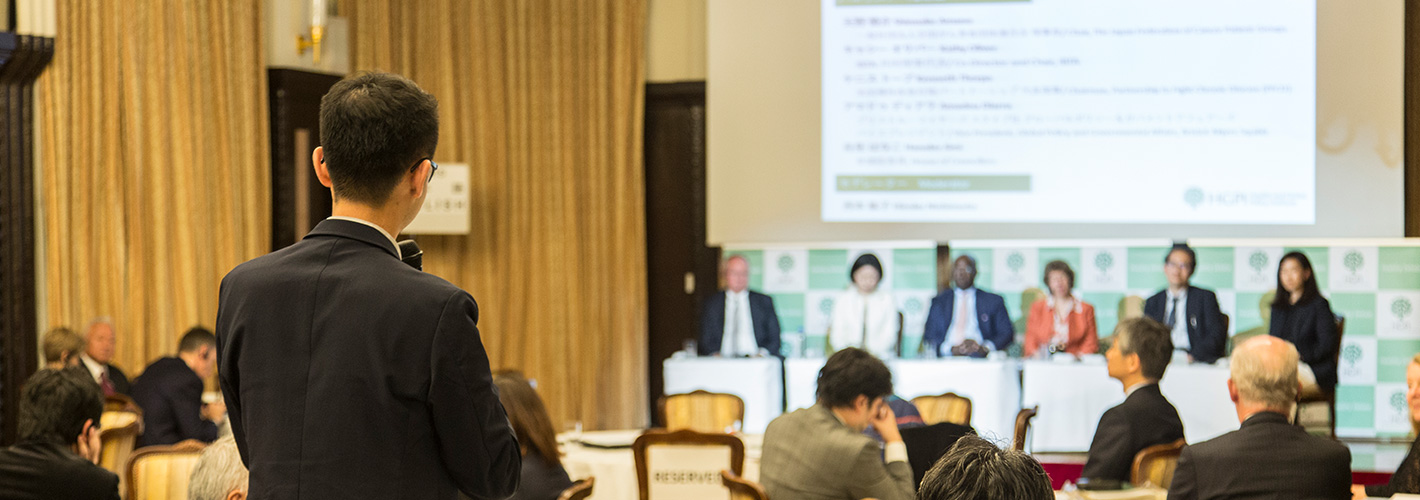Dr. Takenori Yamaguchi
- Home >
- professionals >
- Dr. Takenori Yamaguchi
What I look for is that the NCD multi-stakeholders meeting will have impact on issues such as revising the law. Also, it is important to educate our people that NCDs are preventable by lifestyle modification.
Cooperation with the other relevant organizations to control stroke
The Japan Stroke Association had put a huge effort in urging the law legislation for the basic policy in stroke. At the same time, Academy of Neurology, Neurosurgical Society, the Board of Emergency Medicine, Rehabilitation Medicine, Japanese Physical Therapy Association, Association of Occupational Therapists, the Association speech therapist , Association of EMTs and others, have formed a “Council for legislative measures stroke” to urge the administration and legislation. In addition, in the annual scientific meeting for stroke, we usually join with others (e.g. the Stroke Association is a scientific meeting for stroke, in the form of a joint symposium Society of Hematology Japan, Japanese Society of Hypertension, the Japan Diabetes Society, with such as the Japanese Circulation Society etc.) to hold symposiums in exchanging information and ideas. In particular, there are many exchanges among the Academy of Neurology, Neurosurgical Society, Association of Rehabilitation Medicine, Society of Critical Care Medicine and the like.
I agree with the idea of forming an alliance for the cross-related diseases, yet we need to understand and identify the common factors and the unique factors to the individual diseases. The Japan Stroke Association has a long history where it was first established in 1997, and became an incorporated association in 2005. Now we have set branches at all over the 46 prefectures and ordinance-designated cities, and are very well organized. In the “stroke strategy meeting” in 2007, we came to the conclusion that it is necessary to have different approaches from various aspects to overcome stroke, and policy needs to be made to achieve our goal. For instance, what we see today is that even when we can successfully host public educational campaign, yet continuity is difficult because all involves are volunteers with no pay, and also there are reasons that we need to strengthen the medical personnel (medical staff physicians, hospitals and other, such as emergency services). “Special Committee on the Study of the Stroke Policy” was created in order to achieve this purpose. The committee members included the representatives from Japan Stroke Association, Nurses Association, Association of PT • OT • ST, patient association, as well as the former NHK announcer Mr. Shizuo Yamakawa, which had then made the outline for the basic policy. We believe the basic policy will create a mutual understanding between the Ministry of Health, Labour and Welfare ministries, the Ministry of Education, Culture, Sports, Science, and the Ministry of Internal Affairs and Communications, which allows propaganda and educational activities to be carried out easier. There were also suggestions that the basic policy should included measurements for cardiovascular diseases as they shared common risk factors. However, many also felt that it would be difficult to conclude a specific policy when the post-interventions and prognostic symptoms vary widely between stroke and cardiovascular diseases.
It is necessary for promoting domestic measures for NCD, where the related academic societies should actively discuss the situation, and joint discussions will be particularly important. We need to take the cross-related diseases as a whole into the discussion, and the NCD policy should have an impact on the society. However, this would need a good balance between the horizontal and the vertical networks.
Global Expansion is Expected
I think it is possible to for us to share to the world of what we have learned if cross-related NCDs control policy is successfully implemented in Japan. Yet, unless we have a close communication with various stakeholders, the effort will not be success. NCDs (hypertension, diabetes, dyslipidemia, and hyperuricemia) are considered as lifestyle diseases that shared many common risk factors in lifestyle habits (eating/drinking too much, over smoking, overworked, laziness), which can be improved by lifestyle modification. It is important to educate the citizens that these diseases can be improved, and also particularly of what should be carried out appropriately and promptly in emergency response to the acute onset of ischemic heart disease and stroke. At this level, these actions would be the same for both cardiovascular and stroke diseases. However, we will also need to be reminded that the aftereffects of subsequent care are quite different. The cooperation between the alliances of local healthcare, medical diagnosis and cross-related diseases will continue to play a major role. This cooperation is especially important and necessary for stroke. Recently, cooperation is seen in between the acute phase and rehabilitation phase for the stroke patients. I will expect more and more to be developed in the future.


